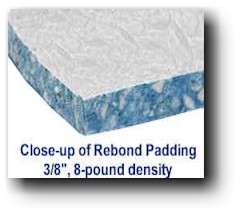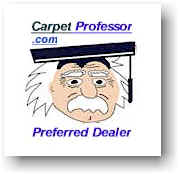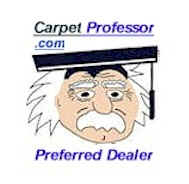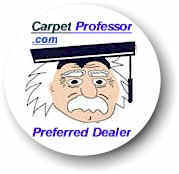How To Choose New Flooring Like A Pro!
Carpet | Vinyl & Tile | Recommended Stores
(Sitemap - No Carpet or Flooring Sales - Homepage)
Carpet Padding to Extend your Carpet Warranty?
We have already discussed various padding types and specifications that you may want to consider. The standard padding for most residential carpets is Rebond or Foam, 1/4" to 1/2" thick, with a density rating of 6 to 8 pounds. These are the minimum padding requirements.
Depending on your application, Commercial grade or Berber Styles may require Reduced Thickness or Increased Density to help prevent waves and wrinkles from forming.
What is Specialty Padding?
I consider these types of padding "special" because they cost more and their long-term benefits are rarely worth the extra cost.
-
Moisture Barrier
-
Odor-Eating
-
Air Filtering
-
Memory Foam
-
Baking Soda Infused
-
Pad that extends a carpet warranty
Read Shaw's Residential Carpet Warranties:
Examples of "Extended Warranty" Padding Upgrades by Shaw Industries
1. Shaw "St. Jude Courage" 734PD Carpet Padding
List price: $359.99 roll (30 square yards) (6' x 45')
Shaw "Courage" padding is one of the premium styles of the St. Jude Padding Collection This pure foam padding offers extra comfort and durability. This cushion comes with R2X barrier that prevents moisture or spills from penetrating up to 24 hours.
Courage padding is 1/2" thick, 9 pound density and comes with a lifetime warranty. Courage adds 10 years additional warranty to any new Shaw Residential Carpet or Tuftex Carpet warranties. Each padding roll covers 30 square yards or 270 square feet.
- Density: 9 lb
- Thickness: 1/2" inches
- Contains Anti-microbial treatment and is Pet Friendly.
- Life of the Home Warranty
- Extends all wear warranties on Anso, Evertouch, Caress, and Cleartouch by 10 years.
- For every yard sold, 18 cents is donated to St. Jude. ($5.40 per 30 yd roll)
The roll price of 359.99 equals $12 per square yard or $1.33 per square foot.
2. Shaw "St. Jude Victorious" 831PD Carpet Padding
List price: $299.95 roll (30 square yards) (6' x 45')
Shaw Victorious padding is considered to be the flagship style of the St. Jude Padding Collection This highly durable and comfortable padding maintains its original firmness and support 25% longer compared to other padding. R2X barrier prevents moisture or spills from penetrating up to 24 hours.
It is 10 lb density, and this provides exceptional comfort and durability. St. Jude Victorious padding is 7/16" thick and has lifetime cushion warranty. In addition to this, Victorious adds 10 years additional warranty to any new Shaw Residential Carpet or Tuftex Carpet warranties. Each padding roll covers 30 square yards or 270 square feet and it is sold by yard.
Features and Benefits:
- Density: 10 lb
- Thickness: 7/16 inches
- Contains Anti-microbial and is Pet Friendly.
- Life of the Home Warranty
- Extends all wear warranties on Anso, Evertouch, Caress, and Cleartouch by 10 years.
- For every yard sold, 18 cents is donated to St. Jude ($5.40 per 30 yd roll).
The roll price of $299.95 equals $9.99 per square yard or $1.11 per square foot.
According to Shaw Industries Warranty:
Shaw warrants that this carpet will not exhibit significant twist loss or loss of texture from foot traffic for a period of ten (10) years when used in an owner-occupied residence in a proper indoor installation. Proper installation requires use of a suitable pad with a thickness of 7/16" or less and minimum 6-lb density, following the Carpet & Rug Institute Installation Standard effective October 1, 2009.
Consult your retailer for details. If your carpet does not perform according to the warranty, Shaw may offer a credit equal to the cost of the carpet material only in accordance with a replacement schedule similar to this:
1st Year. . . . . 100% 6th Year. . . . .90%
2nd Year. . . . .100% 7th Year. . . . . 80%
3rd Year. . . . . 100% 8th Year. . . . . 70%
4th Year. . . . . 100% 9th Year. . . . . 60%
5th Year. . . . . 100% 10th Year. . . . .50%
(example)
Warranty Exclusions
Carpet installed outdoors or in areas subject to other than ordinary shoe traffic is excluded from this warranty. Crushing caused by wheels, heavy furniture, including impressions left by legs of furniture, is not covered by this warranty.
The texture of any carpet will change to some degree in heavy traffic areas. Such conditions constitute normal wear and tear and are not covered by this warranty, which is intended to protect you from excessive appearance change. What is Considered Excessive Appearance Change?
Q. Do I need Pad to extend my new carpet warranty?
Paying more for a high-priced padding may double a 10-year warranty to 20-years however, this may only apply to their "Texture Retention" portion of the warranty. What does "Texture Retention" mean? It's not what you think. Read Shaw's Residential Carpet Warranty snippet below to see exactly what a typical manufacturers carpet warranty will and will not cover:
Some major carpet brands have a special offer for homeowners!
If you are willing to pay extra for their "Special Carpet Padding" they will double your new carpet warranty! But there's a catch. The special padding they want you to purchase is very costly and the increase in warranty coverage usually only applies to the "Texture Retention" portion of their new carpet warranty.
According to Mohawk Industries:
“Texture Retention” is the ability of the carpet tufts to retain their visible shape, as measured by the degree of bursting, opening, or untwisting of the tufts at the surface of the carpet. Texture retention is measured against standardized rating scales ranging from 5.0 (new or no change) to 1.0 (severe change), ISO Standard 9405-1990.
To perform as warranted, the carpet must retain a texture rating of at least 2.5 under warranted conditions. If, within the warranty period, a texture rating of less than 2.5 occurs under warranted conditions, Mohawk will handle such claims as stated in the “Mohawk’s Limited Liability” section of Mohawk's warranty booklet.
__________________________________________________________________________________
Padding Thickness
Whatever carpet style or brand you select, a certain type, thickness and density of padding is required by the carpet manufacturer to keep your carpet warranty in force. For most residential carpets, a 7/16" thickness is most common and either a 6 pound density or an 8 pound density will be selected.
Don't make the mistake of thinking that a thicker pad is a better pad. If you chose a padding that is too thick it can cause wrinkles to develop in your carpet over time. In most homes 7/16" is the thickest padding you would want to select to keep the carpet warranty in force.
Padding Density
Padding is also rated by its density. Some pads have a low density rating of 3 to 5 pounds and are typically used in apartments because it is less expensive and will be replaced more frequently. Looped Berber styles and commercial grade carpets require a special low profile and high density padding. Usually a 3/8" thickness or less, and a density of 8 pounds or higher. If in doubt, you can call the carpet manufacturer to get the correct padding requirements needed to keep from voiding your carpet warranty. See my List of Carpet Manufacturer Websites and Phone Numbers.
Padding used in residential applications usually has a density rating of 6 to 8 pounds. 10-pound density pads are also available for an additional cost. Some padding are rated in ounces instead of pounds. For example, 128 ounces is the equivalent of an 8-pound pad. Rubber pad densities are usually rated in ounces. Some folks prefer the 6-pound density padding because it is softer underfoot. However, an 8-pound padding provides better support for your carpet and will generally make it wear better, especially in high traffic areas like stairs and hallways. The higher the density rating the more firm the feel is underfoot. The higher the density rating, the firmer the padding will be. Firmer pads provide better the support for your carpet. Better support means a lower chance for wrinkles to form.
Types of Padding?
Rebond Pad (Best Bang for your Buck!)
This type of pad is most common in the residential setting. It is made from recycled materials, mainly from recycled urethane foam and is multicolored.
It is available everywhere, and in almost every thickness and density. This is the most economical choice for your home, rental or office. Not all Rebond padding is of high grade or top quality. Every padding manufacturer offers several grades of Rebond padding to their distributors. Retailers have a choice of which grade of Rebond padding to offer to their customers.
The main difference will be the type of recycled materials used to manufacture the padding. The higher the quality of recycled materials used, the better the Rebond pad will be. Reputable carpet dealers always offer top quality Rebond padding to their customers. The price you pay for a good quality padding may be slightly higher than at the shady discount carpet store down the street, however you should never skimp when it comes to buying a good quality padding to go under your good quality carpet.
-
The Grade of Padding you select must MATCH the Grade of Carpet you select. If you buy a carpet designed to last 15 years, then you must buy a padding that is designed to last at least 15 years.
-
Typical Cost for a 6 to 8-pound density Rebond Pad is about $3.50 - $5.50 per square yard or about 39 to 45 cents per square foot.
Foam Padding (Urethane)
This type of pad is often very inexpensive and lightweight. If a retail store tries to give you free pad with your carpet purchase, this is usually what they plan to give you. This type of padding will not tolerate much traffic. It will soon become completely flat as a pancake after a year or so and is not a good choice for a residential setting. This is often used in apartment settings where the carpet lifespan is less than 3 years.
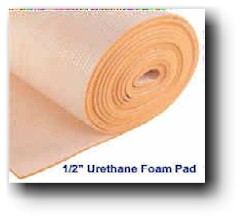 Prime Urethane Foam
Prime Urethane Foam
Not made of recycled materials, this type of pad is called prime or virgin urethane. It's a better grade of foam pad (frothed foam) that could be a good choice for the home. It is made of very dense urethane (polyurethane). It is designed primarily for commercial applications, but is becoming more common in residential applications. The cost more than a standard Rebond and not a common choice among homeowners.
Wool or Fiber Pads
These types of natural wool or fiber pads are used primarily for Berbers and commercial carpets. They are very dense, breathe well, and are not spongy at all. They are made from recycled, shredded fabrics or natural wool. They are designed to support and allow looped Berbers and commercial carpets to wear well in heavy traffic situations, and to prevent these types of carpets from stretching out and developing wrinkles.
Synthetic Fiber Pads
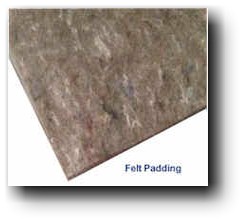 Synthetic fiber padding is also a great choice for
basements with concrete floors as it breathes well, resists mold and mildew
and has anti-microbial properties. I would always choose this type of
pad for any basement or area prone to having moisture problems.
Synthetic fiber padding is also a great choice for
basements with concrete floors as it breathes well, resists mold and mildew
and has anti-microbial properties. I would always choose this type of
pad for any basement or area prone to having moisture problems.
Rubber Pad (waffle or flat)
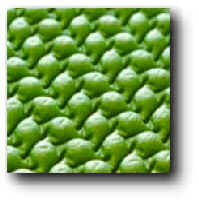 I seldom recommend using a rubber waffle pad in
residential applications. Rebond pad is a much more economical choice and it
does a great job at supporting your carpet as long the correct thickness and
density is selected.
I seldom recommend using a rubber waffle pad in
residential applications. Rebond pad is a much more economical choice and it
does a great job at supporting your carpet as long the correct thickness and
density is selected.
Rubber slab padding is often used in commercial applications over concrete. Rubber padding density is usually rated in ounces.
Specialty Pads:
Moisture barrier pads, odor eating pads, pet odor pads, baking soda pads
Some carpet salespeople may try to convince you to upgrade your order with a specialty pad that has claims of being able to eliminate odors or have a moisture barrier surface that will help with pet accidents. I don't generally recommend these type of pads and suggest you avoid the extra expense. I believe it will just cost you more money and not solve or diminish your pet accident problems. If you have a pet urine problem there is no padding on the market today, that I know of, that will solve your problem. Spending more money on a specialty pad will likely not reduce the severity of your pet accident problem. Do I Need A Moisture Barrier Pad?
Don't Assume a Specialty Pad Will Solve Your Pet Urine Problems
If you have a pet urine problem, upgrading to a more expensive pad will not help you. It won't make it easier to clean or reduce the severity of your problem. If you have a moisture problem in your basement, no moisture barrier padding is going to protect you from the dangers of mold and mildew.
Don't be fooled into thinking that spending more money on a specialty pad will solve your pet or moisture problems, it just doesn't work that way. You need to address your problems first and then I recommend you select a good quality pad that is designed to properly support your carpet and meet your needs and goals.
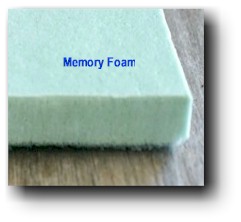 These
enhanced carpet pads are more costly than a
standard Rebond padding. They may offer certain unique benefits for some
applications, but in most cases I do not believe any of these Special
Pads are a wise or necessary choice for most homeowners.
These
enhanced carpet pads are more costly than a
standard Rebond padding. They may offer certain unique benefits for some
applications, but in most cases I do not believe any of these Special
Pads are a wise or necessary choice for most homeowners.
With pet urine problems, I have not found a way for homeowners to determine if using a special pad is worthwhile.
Learn more:

